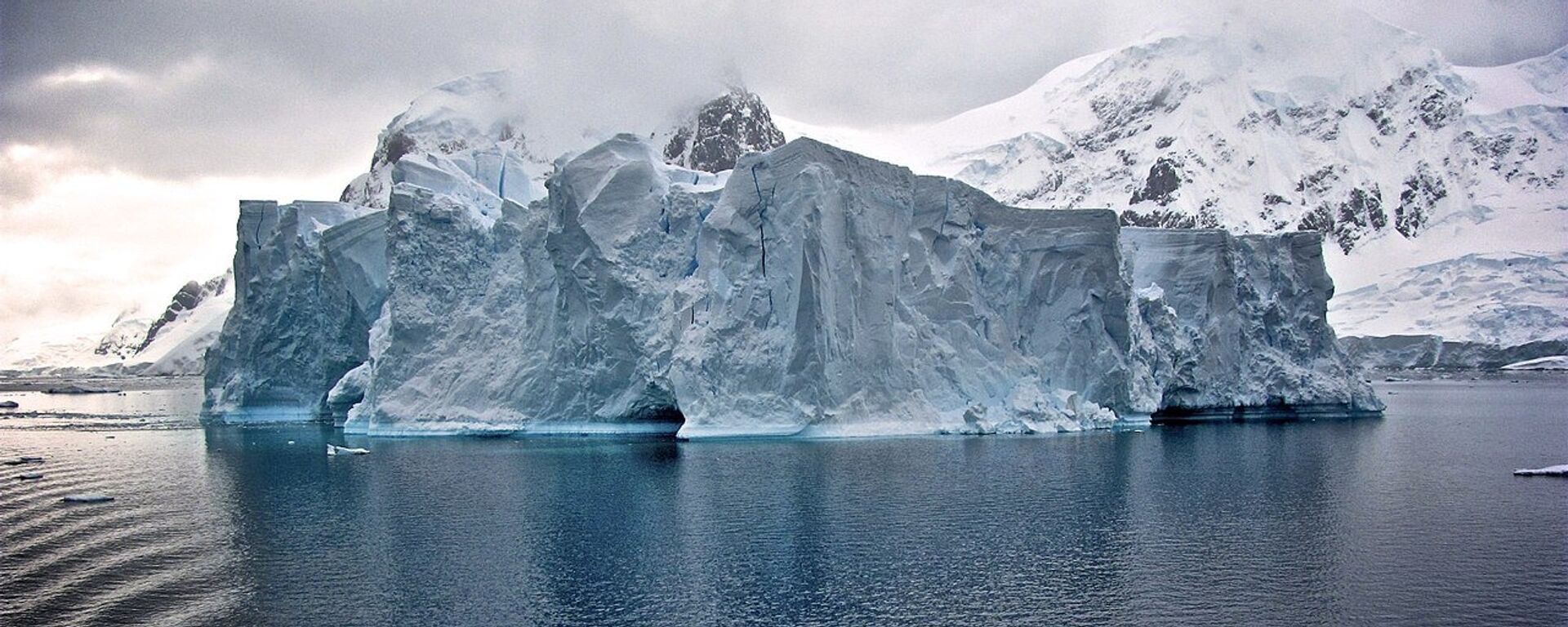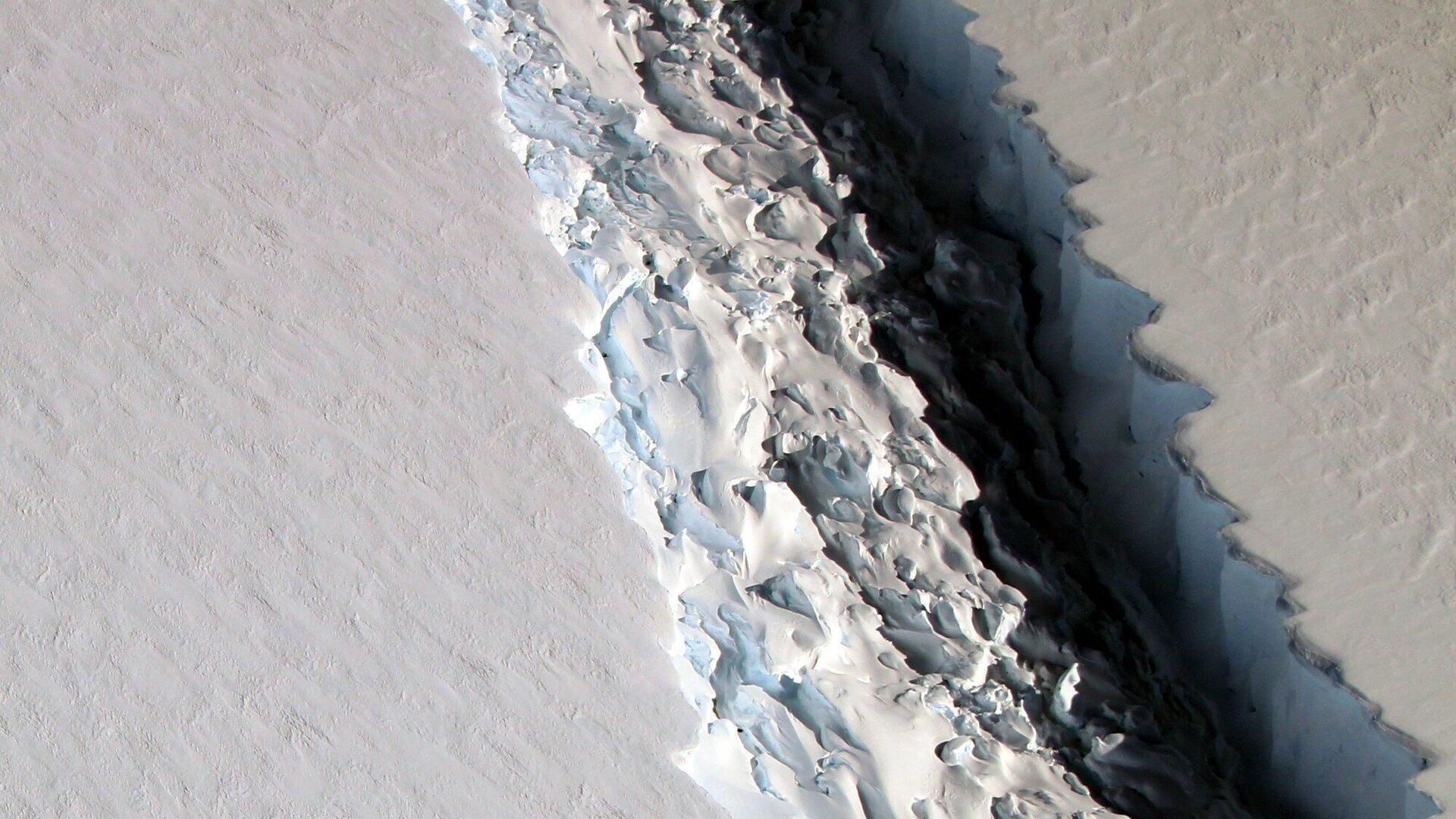https://sputnikglobe.com/20220415/scientists-believe-melting-of-antarcticas-large-ice-shelf-could-be-caused-by-rivers-in-the-sky-1094773403.html
Scientists Believe Melting of Antarctica's Large Ice Shelf Could Be Caused by 'Rivers in the Sky'
Scientists Believe Melting of Antarctica's Large Ice Shelf Could Be Caused by 'Rivers in the Sky'
Sputnik International
This March, the southernmost continent, Antarctica, has recorded an abnormal surge in temperatures, with the temperature on the Antarctic Plateau soaring by... 15.04.2022, Sputnik International
2022-04-15T03:37+0000
2022-04-15T03:37+0000
2023-01-15T17:48+0000
science & tech
river
environment
antarctic
antarctica
earth
weather
https://cdn1.img.sputnikglobe.com/img/07e6/04/0f/1094774260_0:98:2000:1223_1920x0_80_0_0_d49b48a0a6729fddf80e54951df4c45a.jpg
An international group of scientists believes it has found a reasonable explanation for the process of melting and breaking off of the ice shelf from the Antarctic Peninsula, and the so-called "rivers in the sky" play an important role in this, newly published research in the Nature journal Communications Earth & Environment has suggested.As a giant ice sheet about the size of Los Angeles crumbled last month, scientists noted they were not sure what role extreme temperatures played in the event, but the heat rushed in through what is known as an atmospheric river, a long plume of moisture that transports warm air and water vapor from the tropics to other parts of the Earth.The authors of the study used algorithms, climate models, and satellite observations to find that between 2000 and 2020, atmospheric rivers triggered 60% of the peninsula's calving events (when an iceberg breaks off an ice shelf or glacier).The study suggests that those so-called "rivers in the sky," which dump rain and snow when they make landfall, are also causing extreme temperatures, surface melt, sea-ice disintegration and large ocean swells, which are destabilizing ice shelves on the Antarctic Peninsula.According to the paper, the same conditions were experienced during the summers of 1995 and 2002, when two of the peninsula's ice shelves, Larsen A and B, collapsed. The world's largest surviving ice shelf, Larsen C, is currently in danger of total collapse as a result of the climate catastrophe, the study asserted.The ice shelves can destabilize in a variety of ways. Foehn winds, a warm, dry air that flows down a mountain after chilly, wet air has come up the other side, have been observed for Larsen A, B and C.They can result in abrupt and significant temperature shifts, as well as ice melt in Antarctica. And according to scientists, that can have unintended consequences, such as ice shelf fracture, which is the section of a land-based ice sheet that juts out into ocean water.Moreover, melting sea ice exposes ice shelves to ocean waves, which can further destabilize the ice shelves. One of the study's main authors, Jonathan Wille of the Université Grenoble Alpes in France, told CNN upon the publication that the research discovered "that all these different aspects are actually caused by atmospheric rivers, especially the intense ones."It is worth mentioning that breaking ice shelves can raise sea levels, but they are unlikely to add a lot of volume as they are already floating in the water. However, ice shelves are crucial in averting a substantially higher rise in sea level.However, scientists admit they do not know if there is a link between atmospheric rivers and climate change, but the recent heat wave and weather conditions in Antarctica at the time were so extraordinary that they are beginning to believe the issue with the atmospheric rivers might be to blame. But only if a comparable situation occurs again in the future will this become evident.And according to CNN, while the frequency of atmospheric rivers in the future is unclear, Wille predicted they will become more severe, which could be enough to cause additional destabilization.The melting of the Greenland ice sheet in the Arctic is responsible for the majority of the world's ice melt and sea level rise thus far. But according to some estimates, if the whole of Antarctica melted, then ocean levels could rise by 60 meters, causing a massive catastrophe.
https://sputnikglobe.com/20210821/earths-inner-heat-chipping-away-at-antarcticas-doomsday-glacier-study-says-1083679865.html
antarctic
antarctica
earth
Sputnik International
feedback@sputniknews.com
+74956456601
MIA „Rossiya Segodnya“
2022
News
en_EN
Sputnik International
feedback@sputniknews.com
+74956456601
MIA „Rossiya Segodnya“
Sputnik International
feedback@sputniknews.com
+74956456601
MIA „Rossiya Segodnya“
science & tech, river, environment, antarctic, antarctica, earth, weather
science & tech, river, environment, antarctic, antarctica, earth, weather
Scientists Believe Melting of Antarctica's Large Ice Shelf Could Be Caused by 'Rivers in the Sky'
03:37 GMT 15.04.2022 (Updated: 17:48 GMT 15.01.2023) Kirill Kurevlev
Managing Editor
This March, the southernmost continent, Antarctica, has recorded an abnormal surge in temperatures, with the temperature on the Antarctic Plateau soaring by around 38 degrees Celsius to 11.5 degrees below zero. The average daily temperature has been recorded at around 49 degrees Celsius, causing the major collapse of a big chunk of the ice shelf.
An international group of scientists believes it has found a reasonable explanation for the process of melting and breaking off of the ice shelf from the Antarctic Peninsula, and the so-called "rivers in the sky" play an important role in this,
newly published research in the Nature journal Communications Earth & Environment has suggested.
As a giant ice sheet about the size of Los Angeles crumbled last month, scientists noted they were not sure what role
extreme temperatures played in the event, but the heat rushed in through what is known as an
atmospheric river, a long plume of moisture that transports warm air and water vapor from the tropics to other parts of the Earth.
The authors of the study used algorithms, climate models, and satellite observations to find that between 2000 and 2020, atmospheric rivers triggered 60% of the peninsula's calving events (when an iceberg breaks off an ice shelf or glacier).
The study suggests that those so-called "rivers in the sky," which dump rain and snow when they make landfall, are also causing extreme temperatures, surface melt, sea-ice disintegration and large ocean swells, which are destabilizing ice shelves on the Antarctic Peninsula.
According to the paper, the same conditions were experienced during the summers of 1995 and 2002, when two of the peninsula's ice shelves, Larsen A and B, collapsed. The world's largest surviving ice shelf, Larsen C, is currently in danger of total collapse as a result of the climate catastrophe, the study asserted.
"The loss of the buttressing effect from these ice shelves leads to further continental ice loss and subsequent sea-level rise," the paper reads. "Under future warming projections, the Larsen C ice shelf will be at-risk from the same processes."
The ice shelves
can destabilize in a variety of ways. Foehn winds, a warm, dry air that flows down a mountain after chilly, wet air has come up the other side, have been observed for Larsen A, B and C.
They can result in abrupt and significant temperature shifts, as well as ice melt in Antarctica. And according to scientists, that can have unintended consequences, such as ice shelf fracture, which is the section of a land-based ice sheet that juts out into ocean water.

21 August 2021, 18:24 GMT
Moreover, melting sea ice exposes ice shelves to ocean waves, which can further destabilize the ice shelves. One of the study's main authors, Jonathan Wille of the Université Grenoble Alpes in France,
told CNN upon the publication that the research discovered "that all these different aspects are actually caused by atmospheric rivers, especially the intense ones."
"And we found that almost all the really extreme temperature events that happen in the Antarctic Peninsula were happening with atmospheric rivers," he is quoted as saying.
It is worth mentioning that breaking ice shelves can raise sea levels, but they are unlikely to add a lot of volume as they are already floating in the water. However, ice shelves are crucial in averting a substantially higher rise in sea level.
"Ice shelves keep the glaciers that are on land behind them from flowing into the ocean," Wille told the outlet. "And when these shelves disappear, there's nothing holding back those glaciers. Their velocity increases and starts flowing into the ocean. And that then directly contributes to sea level rise."
However, scientists admit they do not know if there is a link between atmospheric rivers and climate change, but the recent heat wave and weather conditions in Antarctica at the time were so extraordinary that they are beginning to believe the issue with the atmospheric rivers might be to blame. But only if a comparable situation occurs again in the future will this become evident.
"ARs are linked to only a small percentage of the total summer melt on the AP, but critically cause particularly widespread and intense foehn melt events like the event that triggered the collapse of the Larsen B via a hydrofracturing cascade," the research team wrote in the conclusion. "This, along with the connection to sea-ice clearance and swell-induced stress also linked to the Larsen B and A collapses, make ARs a destabilizing force for ice shelves."
And according to CNN, while the frequency of atmospheric rivers in the future is unclear, Wille predicted they will become more severe, which could be enough to cause additional destabilization.
"It's kind of simple -- as the atmosphere becomes warmer, it's able to hold more moisture, and since an atmospheric river is essentially the transport of moisture, that means there will be more moisture that can be transported to Antarctica," he said.
The melting of the Greenland ice sheet in the Arctic is responsible for the majority of the world's ice melt and sea level rise thus far. But according to some estimates, if the whole of Antarctica melted, then ocean levels could rise by 60 meters, causing a massive catastrophe.


